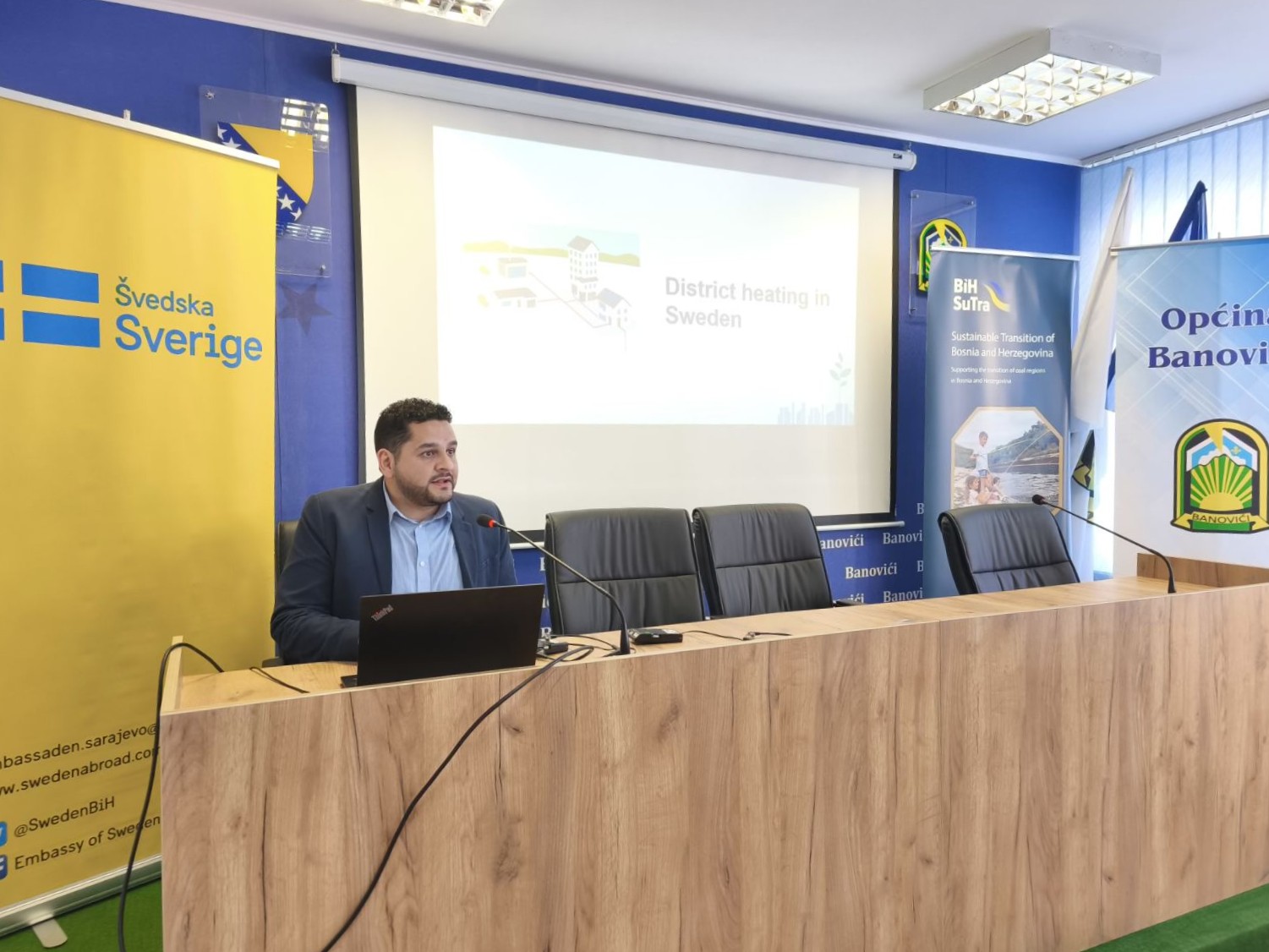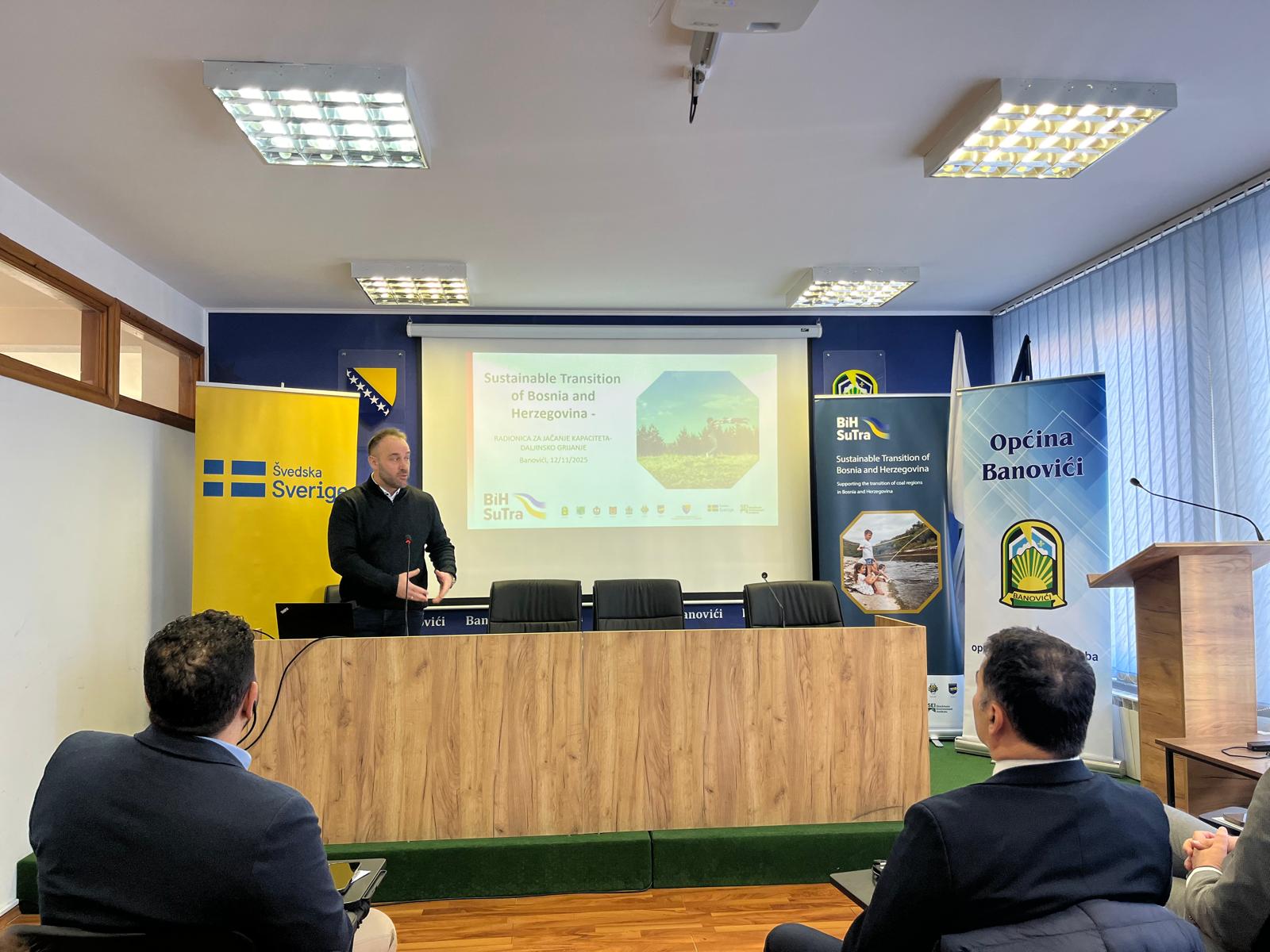 Participants learning about sustainable district heating in Banovići. Photo: BiH SuTra.
Participants learning about sustainable district heating in Banovići. Photo: BiH SuTra.
 Participants learning about sustainable district heating in Banovići. Photo: BiH SuTra.
Participants learning about sustainable district heating in Banovići. Photo: BiH SuTra.
When district heating expert Ariana Tanha from the Swedish company Ekzel AB took the floor at a workshop in Banovići yesterday, participants were excited to hear about Sweden’s experience in building one of the world’s most advanced and sustainable district heating systems. Drawing on years of professional experience, Tanha also shared practical insights on the economics of combined heat and power (CHP) plants – systems that simultaneously produce both heat and electricity.
This workshop was a training held as part of the BiH SuTra project in Banovići on 12 November 2025. Participants explored practical ways to plan and implement modern and sustainable district heating systems in their communities, with a special focus on Swedish experiences and approaches. The event brought together representatives of local self-government units engaged in the BiH SuTra project – the Municipality of Banovići, Municipality of Breza, Municipality of Gacko, City of Gradiška, Municipality of Kakanj, Municipality of Ugljevik and City of Živinice – to jointly explore how Bosnia and Herzegovina can plan and implement more sustainable district heating solutions at both national and local levels.
Clean heat in action – Sweden’s energy efficiency model
In Sweden, district heating systems began developing in the early 1950s in response to the growing need for centralized heating in urban areas. During the 1960s and 1970s, industrial facilities and CHP plants (Combined Heat and Power – cogeneration plants) enabled a rapid expansion of the networks, particularly in residential areas.
CHP plants simultaneously produce heat and electricity from the same fuel source, achieving significantly higher energy efficiency. Instead of letting the heat generated during electricity production go to waste, it is used to heat buildings through district heating networks.
Today, Sweden is a global frontrunner in district heating and decarbonization, with a high share of renewable energy and recovered heat from industrial facilities and other energy systems.
Decarbonization means reducing or phasing out the use of fossil fuels, replacing coal, oil, peat and natural gas with renewable and recycled sources such as biofuels, waste heat, excess industrial heat, biogas and heat pumps. “The goal is to create a system that is efficient, clean and sustainable, while remaining reliable for all users. The benefits of decarbonization include lower greenhouse gas emissions, increased energy security through reduced dependence on imported fossil fuels, more stable energy prices and advantages linked to the circular economy,” emphasized Ariana Tanha, Swedish district heating expert, during the workshop.

From resistance and “not in my backyard” – to turning waste into energy
In Sweden, waste is used as a valuable energy source through Waste-to-Energy (WtE) plants, where non-recyclable waste is converted into heat and electricity. Ariana Tanha emphasizes: “It is important for the public to understand that only waste that cannot be recycled is used for energy, while all other waste goes to recycling. Transparency is key to building trust.”
Modern WtE systems are highly efficient and clean, with advanced emission controls and the possibility to recover metals from ash. “Our experience shows that when people see the tangible benefits, heat in their homes and reduced emissions, opposition disappears,” Tanha adds.
Approximately 25% of Sweden’s district heating production comes from waste incineration. Sweden also imports waste from other countries to ensure a stable fuel supply. Modern systems incorporate technologies such as CCS (Carbon Capture and Storage) and CCU (Carbon Capture and Utilization) to reduce CO₂ emissions, making waste-to-energy use environmentally sustainable.
With the right support, BiH’s district heating can power the transition
The workshop in Banovići was further enriched by the contribution of local district heating expert, Nihad Harbaš from nLogic Advisory. He shared with participants the role of district heating systems in energy transition plans, the current state of Bosnia and Herzegovina and the region regarding the integration of renewable energy sources into district heating systems, as well as options for decarbonization and financing of modernization projects.
District heating is recognized in BiH national strategies as a key component for decarbonizing the heating sector. “However, given the average age of heating plants at 29 years and distribution networks at 21 years, it is clear that these systems face significant maintenance and efficiency challenges. According to the BiH Energy Framework Strategy until 2035, there is a highlighted need for system modernization, network expansion and feasibility studies for optimal development models, with a special focus on establishing an adequate legislative and regulatory framework that will systematically govern this sector and enable its sustainable development,” explained Nihad Harbaš.

During the workshop, Harbaš also emphasized that modernizing existing systems and transitioning to renewable sources (such as biomass, solar energy and heat pumps) has a significant potential to reduce emissions, increase energy efficiency and enhance energy security. “Thanks to the conversion of district heating plants to biomass, around 20% of the total heat energy in BiH district heating systems now comes from renewable sources, providing an excellent foundation for further improvements. These processes open opportunities for investment, local energy market development and the engagement of domestic resources, while simultaneously meeting BiH’s climate and energy goals,” he concluded.
The workshop also presented financial models and essential steps for the successful implementation of district heating modernization and upgrade projects, with particular attention to the support available to local communities.
Discover the News and Updates section, delivering the latest updates and insightful content across various topics. Stay informed with most recent news articles, reports, and publications, of the BiH SuTra project.